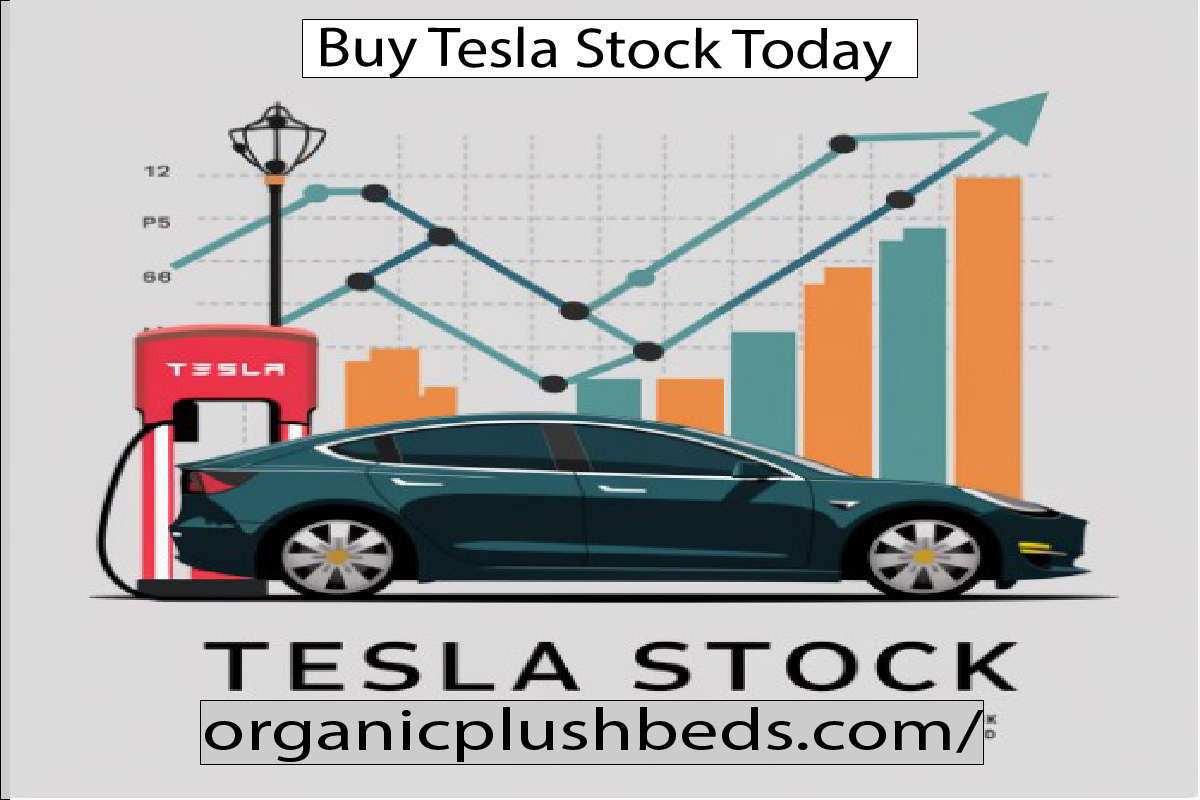Investing in Tesla stock has been a hot topic among investors and market enthusiasts for several years. As one of the most innovative and disruptive companies in the automotive and energy sectors, Tesla has garnered a significant amount of attention. This blog post explores the implications of buying Tesla stock today, covering everything from the company’s current market position to potential risks and rewards.
Understanding Tesla’s Market Position
A Brief History of Tesla
Founding and Early Development
Tesla, Inc. was founded in 2003 by engineers Martin Eberhard and Marc Tarpenning. The company was named after the inventor Nikola Tesla, reflecting its focus on pioneering electric vehicle (EV) technology.
Elon Musk’s Leadership
In 2004, Elon Musk joined Tesla as chairman of the board and later became CEO, steering the company towards rapid growth and innovation. Under Musk’s leadership, Tesla evolved from a niche automaker to a global leader in electric vehicles and sustainable energy.
Mission and Vision
Tesla’s mission is to accelerate the world’s transition to sustainable energy. This mission has guided the company’s development and product strategy, leading to significant advancements in electric vehicle technology and renewable energy solutions.
Tesla’s Business Model
Electric Vehicles (EVs)
Tesla’s core business revolves around electric vehicles. The company designs, manufactures, and sells a range of EVs, including:
- Model S: A luxury sedan known for its performance and long-range capabilities.
- Model 3: A more affordable sedan that has become one of the best-selling EVs globally.
- Model X: An SUV with distinctive falcon-wing doors and advanced safety features.
- Model Y: A compact SUV that offers versatility and a competitive price point.
Energy Storage Solutions
Tesla’s energy division focuses on advanced energy storage systems, which include:
- Powerwall: A home battery designed to store energy from renewable sources and provide backup power.
- Powerpack: A larger energy storage solution intended for commercial and utility-scale applications.
Solar Energy Products
In 2016, Tesla acquired SolarCity, expanding its energy solutions into solar technology. Tesla’s solar products include:
- Solar Panels: High-efficiency panels designed for residential and commercial use.
- Solar Roof: A roofing system that integrates solar technology into aesthetically pleasing tiles.
Current Market Performance
Market Capitalization and Value
Tesla has become one of the most valuable automakers in the world. Its market capitalization frequently surpasses that of traditional automotive giants like Toyota and General Motors. This valuation reflects investor confidence in Tesla’s future growth prospects and innovation.
Stock Performance
Tesla’s stock has experienced significant growth in recent years. Factors contributing to this include:
- Strong Sales Growth: Increased demand for Tesla’s vehicles and energy products.
- Innovative Product Launches: Introduction of new models and technologies that capture market interest.
- Sustainability Trends: Growing investor and consumer interest in green technology and sustainable practices.
Market Trends and Challenges
Tesla continues to navigate various market trends and challenges, including competition from other EV manufacturers, fluctuations in commodity prices, and regulatory changes impacting the renewable energy sector. Despite these challenges, Tesla remains a key player in the transition to sustainable energy.
Reasons to Consider Buying Tesla Stock
Tesla, Inc. has emerged as a standout company in the electric vehicle (EV) and renewable energy sectors. If you’re contemplating an investment in Tesla stock, several compelling reasons might influence your decision. Below, we delve into key aspects that make Tesla a noteworthy investment opportunity.
Strong Growth Potential
Impressive Revenue Growth
Tesla has experienced substantial revenue growth over the past few years. The company’s innovative products and expanding market reach have contributed to a significant increase in annual revenue. As Tesla continues to ramp up production and expand its market presence, analysts anticipate continued revenue growth.
Expansion of Manufacturing Capabilities
Tesla’s strategic investment in new manufacturing facilities, known as Gigafactories, underscores its commitment to scaling production. Key Gigafactories include:
- United States: The Gigafactory in Nevada focuses on battery production and EV assembly.
- China: The Shanghai Gigafactory is crucial for meeting the growing demand in the Asian market.
- Germany: The Berlin Gigafactory aims to enhance production capabilities for the European market.
These factories are designed to increase Tesla’s production capacity, improve supply chain efficiency, and support global expansion.
Rising Global Demand for EVs
The global shift towards electric vehicles is accelerating, driven by regulatory changes and increasing consumer preference for sustainable transportation options. Tesla is well-positioned to capitalize on this trend, with its diverse lineup of EVs and advanced technology.
Leadership in Innovation
Advancements in Battery Technology
Tesla’s battery technology is a cornerstone of its competitive edge. The company has made significant strides in improving battery efficiency, reducing costs, and increasing energy density. Innovations like the new 4680 battery cells are expected to further enhance vehicle performance and reduce production costs.
Pioneering Autonomous Driving
Tesla’s Autopilot and Full Self-Driving (FSD) capabilities represent significant advancements in autonomous driving technology. Tesla is at the forefront of developing and deploying these technologies, which could revolutionize transportation and provide new revenue streams.
Energy Storage and Solar Solutions
Tesla’s innovations extend beyond vehicles into energy storage and solar technology. Products like the Powerwall and Powerpack offer advanced energy storage solutions, while the Solar Roof integrates solar panels into roofing materials, contributing to the company’s vision of a sustainable energy ecosystem.
Commitment to Research and Development
Tesla’s substantial investment in research and development (R&D) ensures it remains at the cutting edge of automotive and energy technology. Continuous innovation is a key driver of Tesla’s market leadership and long-term growth potential.
Environmental Impact and Sustainability
Reducing Carbon Emissions
Tesla’s focus on electric vehicles and renewable energy contributes to reducing carbon emissions. By promoting the adoption of EVs and sustainable energy solutions, Tesla supports global efforts to combat climate change and reduce reliance on fossil fuels.
Supporting Sustainable Practices
Investing in Tesla aligns with the broader trend towards sustainability and environmental responsibility. The company’s mission to accelerate the transition to sustainable energy resonates with environmentally conscious investors looking to support companies with positive environmental impacts.
Government Incentives and Regulations
Many governments offer incentives for EV purchases and renewable energy investments. Tesla’s alignment with these regulatory frameworks not only enhances its appeal to investors but also provides potential benefits such as subsidies and tax breaks.
Financial Performance
Consistent Profitability
Tesla has demonstrated strong financial performance with consecutive profitable quarters. This profitability reflects the company’s ability to generate positive earnings and manage operational costs effectively.
Strong Cash Flow
Tesla’s robust cash flow is a testament to its financial health and operational efficiency. Positive cash flow supports the company’s growth initiatives, including R&D investments, expansion projects, and new product development.
Increasing Market Share
Tesla’s growing market share in the EV sector highlights its competitive position and ability to capture a significant portion of the market. This growth is supported by strong sales figures and expanding customer base.
Stock Performance and Valuation
Tesla’s stock has shown impressive performance over recent years, with notable increases in value. While the stock’s high valuation may reflect strong growth expectations, it’s important to consider market conditions and the company’s future prospects when evaluating its investment potential.
Investing in Tesla stock
Investing in Tesla stock offers several potential benefits, including strong growth potential, leadership in innovation, alignment with sustainability goals, and impressive financial performance. However, it’s essential to consider your own investment goals and risk tolerance before making a decision. By staying informed about Tesla’s market dynamics and future prospects, you can make a well-rounded investment choice.
Potential Risks of Investing in Tesla Stock
While investing in Tesla stock can offer substantial rewards, it’s important to be aware of the potential risks associated with it. Understanding these risks can help you make an informed decision and prepare for any uncertainties that may arise. Here’s a detailed look at the key risks involved in investing in Tesla stock.
Market Volatility
Stock Price Fluctuations
Tesla’s stock is renowned for its volatility. The company has experienced dramatic price swings, including significant gains and sharp declines. This volatility can be attributed to various factors, including market sentiment, earnings reports, and broader economic conditions. Investors should be prepared for potential short-term losses and fluctuations in stock value.
Investor Sentiment and Speculation
Tesla’s stock price is often influenced by investor sentiment and market speculation. News, rumors, and public statements from high-profile individuals like CEO Elon Musk can lead to rapid changes in stock price. This speculative nature can add to the stock’s volatility and impact its performance.
High Valuation
Price-to-Earnings (P/E) Ratio
Tesla’s stock is considered highly valued compared to traditional automakers. Analysts often highlight Tesla’s elevated price-to-earnings (P/E) ratio as a sign that the stock may be overvalued. This high valuation suggests that investors are paying a premium for each dollar of earnings, which could impact the stock’s upside potential.
Market Corrections
Given its high valuation, Tesla’s stock may be more susceptible to market corrections. If investor expectations do not align with the company’s performance, or if there are broader market downturns, Tesla’s stock price could experience significant declines. Investors need to be aware of the potential for increased price volatility due to these valuation concerns۔
Competition
Growing EV Market
The electric vehicle market is rapidly evolving, with increased competition from both established automakers and new entrants. Companies like General Motors, Ford, and Volkswagen are investing heavily in EV technology and launching new electric models. This heightened competition could affect Tesla’s market share and influence its future growth prospects.
Technological Advancements
As competitors ramp up their efforts in EV technology, Tesla may face challenges in maintaining its competitive edge. Innovations from rival companies could potentially impact Tesla’s market position and its ability to attract and retain customers.
Regulatory and Operational Risks
Regulatory Compliance
Tesla operates in a highly regulated environment, facing risks related to environmental policies, safety standards, and trade regulations. Changes in government regulations or stricter compliance requirements could affect Tesla’s operations and financial performance. For instance, adjustments in emission standards or subsidies for electric vehicles can impact the company’s cost structure and profitability.
Operational Complexities
Tesla’s global operations involve complex supply chains and large-scale manufacturing processes. Operational risks include:
- Supply chain disruptions:
Tesla relies on a global network of suppliers for raw materials and components. Disruptions in the supply chain, such as shortages or delays, could impact production and delivery schedules.
- Manufacturing Challenges:
Scaling up production to meet growing demand involves significant logistical and operational challenges. Issues such as quality control, labor disputes, or equipment failures can affect manufacturing efficiency and product quality.
- Geopolitical and Trade Issues
As a global company, Tesla is also exposed to geopolitical risks and trade policies. Tariffs, trade restrictions, or geopolitical tensions can impact Tesla’s ability to source materials, export products, or operate in various markets.
Potential Risks of Investing in Tesla Stock
Market Volatility
Tesla’s stock is known for its volatility. While it has seen significant gains, it has also experienced sharp declines. Investors should be prepared for price fluctuations and the potential for short-term losses.
High Valuation
Some analysts argue that Tesla’s stock is overvalued, given its high price-to-earnings (P/E) ratio compared to traditional automakers. This high valuation could limit the stock’s upside potential and make it more susceptible to market corrections.
Competition
The EV market is becoming increasingly competitive, with established automakers and new entrants launching their electric vehicles. Companies like General Motors, Ford, and Volkswagen are investing heavily in EVs, which could impact Tesla’s market share.
Regulatory and Operational Risks
Tesla faces regulatory risks related to environmental policies, safety standards, and trade policies. Additionally, the company’s operations are complex, involving global supply chains and large-scale manufacturing, which can pose operational risks.
Choosing a Brokerage Account
To buy Tesla stock, you need to open a brokerage account. Consider factors such as fees, ease of use, and available research tools when choosing a brokerage. Popular options include Robinhood, E*TRADE, and TD Ameritrade.
Conducting Research
Before purchasing Tesla stock, conduct thorough research. Review the company’s financial statements, analyst reports, and market news. Understanding Tesla’s business model, growth prospects, and risks is crucial for making an informed investment decision.
Placing an Order
Once you’ve chosen a brokerage and conducted your research, you can place an order to buy Tesla stock. There are different types of orders you can use, including market orders, limit orders, and stop orders. A market order buys the stock at the current market price, while a limit order sets a maximum price you’re willing to pay.
Monitoring Your Investment
After buying Tesla stock, monitor your investment regularly. Stay informed about the company’s performance, market trends, and news that could impact Tesla’s stock price. Adjust your investment strategy as needed based on your financial goals and risk tolerance.
Long-Term Outlook for Tesla
Tesla, Inc. has positioned itself as a leader in the electric vehicle (EV) and renewable energy markets. As the company continues to innovate and expand, its long-term outlook remains promising. Here’s an in-depth look at Tesla’s future prospects, focusing on its expansion plans, technological advancements, market trends, and financial health.
Expansion Plans
- New Gigafactories
Tesla’s growth strategy includes the development of new Gigafactories around the world. These state-of-the-art facilities are essential for scaling production to meet rising demand for Tesla vehicles and energy products. Key Gigafactories include:
- Gigafactory Texas:
It’s also expected to be a major hub for producing the Model Y and Cybertruck, and it’s also expected to produce the Tesla Semi.
- Gigafactory Berlin:
Serving the European market, this factory will focus on the Model Y and other upcoming vehicles.
- Gigafactory Shanghai:
This facility addresses the growing demand in Asia and plays a key role in producing the Model 3 and Model Y for the region.
Product Line Expansion
Tesla is planning to broaden its product lineup with several exciting new models:
- Cybertruck:
A highly anticipated electric pickup truck known for its futuristic design and robust performance.
- Tesla Semi:
An all-electric truck designed to transform the logistics and freight industries.
- New Models:
Tesla continues to explore new vehicle segments and innovations to expand its market reach.
Technological Advancements
- Battery Technology
Tesla’s advancements in battery technology are central to its long-term success. The company’s development of the 4680 battery cell represents a significant leap forward:
- Improved Efficiency:
The 4680 cells are designed to enhance energy density and performance, potentially reducing costs and increasing vehicle range.
- Manufacturing Innovations:
New manufacturing processes for these cells aim to streamline production and lower costs, benefiting both Tesla and its customers.
Autonomous Driving
Tesla’s commitment to autonomous driving technology is evident in its ongoing development of Full Self-Driving (FSD) software:
- FSD Software:
Tesla’s FSD technology is continually evolving, with regular updates improving the system’s capabilities and safety features.
- Future Vision:
The company envisions a future with fully autonomous vehicles that could revolutionize transportation and create new business opportunities.
- Energy Solutions
In addition to automotive technology, Tesla is innovating in energy storage and solar solutions:
- Powerwall and Powerpack:
These energy storage solutions are designed to optimize energy use in homes and businesses, supporting renewable energy integration.
- Solar Roof:
An integrated solar solution that combines roofing materials with solar panels to generate clean energy.
Market Trends
- Global Shift to Renewable Energy
The global transition towards renewable energy and electric vehicles presents a favorable environment for Tesla.
- Government Policies:
Many countries are implementing policies to reduce carbon emissions and incentivize the adoption of electric vehicles.
- Consumer Preferences:
Increasing consumer awareness and demand for sustainable products are driving growth in the EV and renewable energy markets.
- Competitive Landscape
While Tesla is a market leader, it must navigate a competitive landscape with other automakers investing heavily in EV technology. Tesla’s ability to stay ahead of competitors through innovation and operational efficiency will be crucial to maintaining its market position.
Financial Health
Robust Revenue and Profitability
Tesla’s financial performance is a key indicator of its long-term potential:
- Revenue Growth:
The company has shown strong revenue growth, driven by increasing vehicle deliveries and expanding energy product sales.
- Profit Margins:
Tesla has achieved profitability in consecutive quarters, reflecting its operational efficiency and successful scaling of production.
Cash Flow and Balance Sheet
Tesla’s strong cash flow and healthy balance sheet provide a solid foundation for future growth:
- Cash Flow:
Positive cash flow supports Tesla’s investments in R&D, manufacturing expansion, and new product development.
- Balance Sheet:
A strong balance sheet with manageable debt levels enhances Tesla’s ability to invest in long-term strategic initiatives.
Market Position
Tesla’s leadership in the EV market positions it well to capitalize on future growth opportunities:
- Brand Strength:
Tesla’s strong brand and market presence contribute to its competitive advantage and customer loyalty.
- Innovation Leadership:
Continued investment in innovation helps Tesla maintain its edge in a rapidly evolving industry.
Tesla’s Outlook
Ambitious Expansion Plans
Tesla’s long-term outlook is bolstered by its ambitious expansion plans. The company continues to scale up its production capabilities, building new factories and expanding existing ones to meet the growing demand for electric vehicles (EVs). This includes the development of the Gigafactory in Berlin and the upcoming Gigafactory in Texas, which aim to increase production capacity and bring Tesla closer to its goal of producing millions of cars annually.
Groundbreaking Technological Advancements
Tesla is at the forefront of technological advancements in the automotive and energy sectors. The company’s innovations in battery technology, autonomous driving, and energy storage are setting new standards in the industry. Tesla’s ongoing research and development efforts aim to improve vehicle performance, extend battery life, and reduce production costs, which are critical for maintaining its competitive edge.
Favorable Market Trends
The market trends favoring electric vehicles and renewable energy significantly enhance Tesla’s growth prospects. As governments worldwide implement stricter emissions regulations and provide incentives for EV adoption, the demand for Tesla’s products is expected to rise. Additionally, the increasing awareness and demand for sustainable and clean energy solutions are likely to drive the growth of Tesla’s energy division, which includes solar products and energy storage solutions.
Strong Financial Health
Tesla’s financial health strengthens its long-term outlook. The company has demonstrated consistent revenue growth, driven by increasing vehicle deliveries and expanding business segments. Tesla’s strong balance sheet, with substantial cash reserves and manageable debt levels, provides the financial stability needed to invest in future projects and navigate potential economic downturns.
Challenges and Risks
Despite its promising outlook, Tesla faces several challenges. The increasing competition in the EV market from both established automakers and new entrants poses a significant threat. Companies like General Motors, Ford, and Volkswagen are ramping up their EV offerings, which could impact Tesla’s market share. Regulatory changes and trade policies also present risks, potentially affecting Tesla’s operations and profitability. Additionally, the complexity of Tesla’s global supply chains and large-scale manufacturing processes introduces operational risks that need careful management.
Commitment to Innovation and Sustainability
Tesla’s commitment to innovation and sustainability is a core strength that supports its long-term success. The company’s vision of accelerating the world’s transition to sustainable energy resonates with consumers, investors, and policymakers. Tesla’s focus on producing environmentally friendly products and reducing its carbon footprint aligns with global sustainability goals, enhancing its brand reputation and market position.
Informed Investment Decisions
By staying informed about Tesla’s expansion plans, technological advancements, market trends, financial health, and the challenges it faces, investors can make educated decisions about the company’s potential. Understanding these factors is crucial for evaluating Tesla’s role in the evolving landscape of electric vehicles and renewable energy, and for assessing its long-term investment potential
Conclusion
Buying Tesla stock today can be a promising investment opportunity, given the company’s strong market position, innovative capabilities, and alignment with sustainability trends. However, it’s essential to consider the potential risks, including market volatility, high valuation, competition, and regulatory challenges. Conduct thorough research, choose the right brokerage, and monitor your investment to make informed decisions. Tesla’s long-term outlook remains positive, with ambitious expansion plans, technological advancements, and favorable market trends supporting its growth. Investing in Tesla offers the potential for significant returns, but it also requires a careful assessment of risks and a long-term perspective.
Additional Considerations
As with any investment, diversification is key. While Tesla may be a compelling addition to your portfolio, it’s important to spread your investments across different sectors and asset classes to mitigate risk. Additionally, staying informed about market trends and company developments will help you make better investment decisions.
In summary, buying Tesla stock today can be a strategic move for investors looking to capitalize on the growth of electric vehicles and renewable energy. By understanding the company’s strengths, evaluating potential risks, and maintaining a long-term investment strategy, you can position yourself to benefit from Tesla’s continued success.











